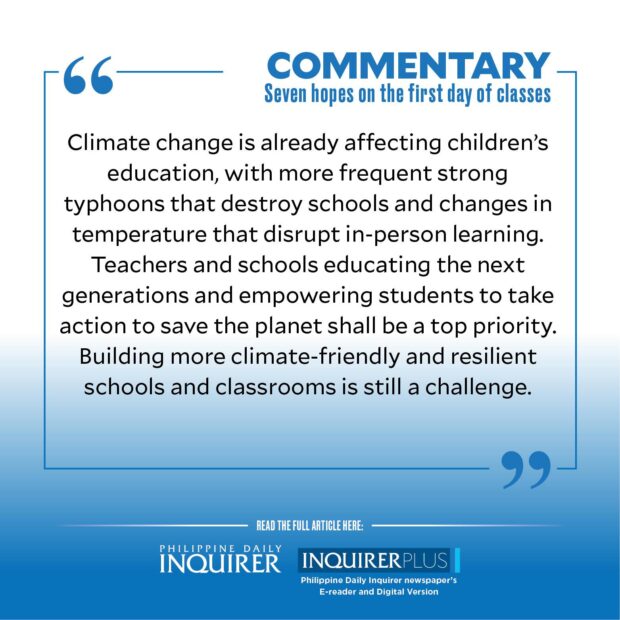Seven hopes on the first day of classes

Sustain the focus on learning recovery and foundational skills. The “Matatag” curriculum is a key step in that direction, as it explicitly prioritizes numeracy and literacy and reduces the excessive number of learning competencies. Unicef is proud to support the Department of Education (DepEd) in developing lesson exemplars for the new curriculum. Building capacities in teachers, schools, and school divisions for its implementation is the next challenge. The adequate use of educational technologies will also help accelerate these efforts, especially with offline solutions (e.g., Learning Passport) to reach rural, last-mile, and multigrade schools.
Reprioritize early childhood education (ECE) for children three and four years old. The global and local evidence that children who attend preschool have better learning outcomes in basic education is vast and indisputable. Making ECE for children three and four years old universal and compulsory (but not a prerequisite to access kindergarten) will increase enrollment in ECE and facilitate the smooth transition of young learners from child development centers to kindergarten.
Article continues after this advertisementTake care of our teachers. DepEd’s improvements to the career development and training of the most important actors in the education system are commendable. Preservice training must be aligned with Matatag agenda, with a focus on foundational skills and key methodologies to teach at the right level, with differentiated strategies, and digital skills.
The most challenging geographical areas have motivated teachers. The recent update on the special hardship allowance will help them fulfill their duty and protect them from potential dangers going to school. Unicef will continue supporting the refinement of the hardship index to ensure that the most deserving teachers have the support they need to continue delivering quality education in difficult circumstances.
Support parents to engage in their children’s education. At home, the parents are a child’s guide to their early education, development, and sustained learning. We can highly benefit from developing policies, as well as implementing communication campaigns and social and behavior change strategies, to strengthen the engagement of parents, their relationship with teachers, and coordination with other parents.
Article continues after this advertisementSupport socio-emotional learning. Foundational skills and socio-emotional learning are strongly correlated as found in the Programme for International Student Assessment (2018) and Unicef Longitudinal Study (2022). Strengthening mental health and psychosocial support policies and creating a positive school environment are essential to make schools safe and allow children to learn. Data show that levels of bullying in schools in the Philippines are significantly elevated (>60 percent) compared to other countries.
Keep equity as a top priority in education policies. Significant progress has been made to strengthen the Alternative Learning System (ALS) for out-of-school adolescents and youth. Unicef is also supporting innovations for microcertification, STEM education, and digital learning in ALS, which we hope can be continued and expanded. Specific policies and more support for children with disabilities and indigenous students remain a pending agenda. BARMM also requires more resources and specific policies to bring children back to school and improve the quality of learning.
Pay more attention to climate change. Climate change is already affecting children’s education, with more frequent strong typhoons that destroy schools and changes in temperature that disrupt in-person learning. Teachers and schools educating the next generations and empowering students to take action to save the planet shall be a top priority. Building more climate-friendly and resilient schools and classrooms is still a challenge. Nothing has ever been more urgent for our world than adapting and mitigating the effects of climate change, in which education is the main hope we can envision.
With hope, we imagine a better education system in the first-ever long-term education sector plan in the Philippines and work toward its implementation with the Matatag agenda. With hope, we can achieve resilience. You can trust that Unicef will continue its work with the education stakeholders and partners to uphold the right to quality education for children in the Philippines.
Isy Faingold is the outgoing chief of education at Unicef Philippines, having spent more than four years in the country. He has over 15 years of experience in the public sector and international organizations in the design, implementation, and evaluation of education and social programs. He has a master’s degree in public affairs from Princeton University.
















